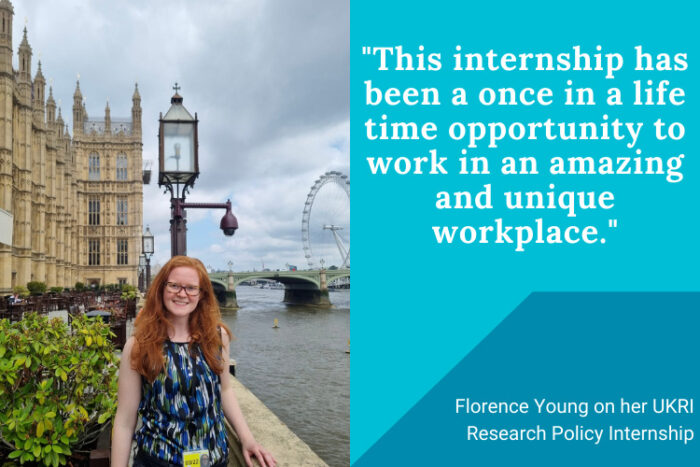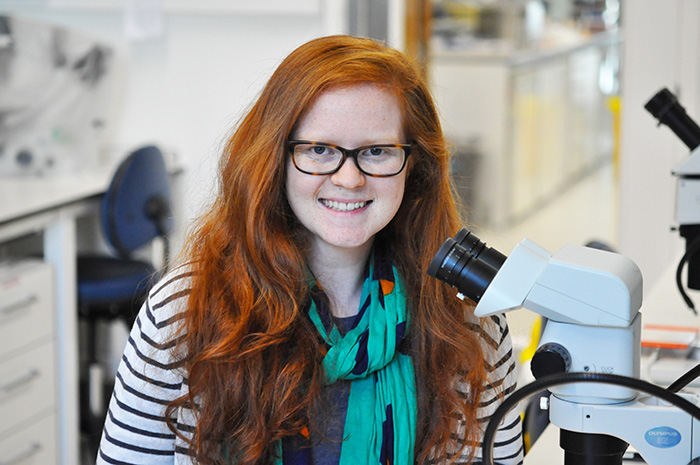
Florence Young, a PhD student in the LMB’s Cell Biology Division, has recently completed a three-month UKRI Research Policy Internship at the Parliamentary Office of Science and Technology (POST). The scheme allows doctoral students funded by the research councils of UKRI to work in one of twenty-two policy organisations and work on tasks such as producing a briefing paper, participating in a policy inquiry or organising a policy event.
During her internship, Florence was seconded to work at the Health and Social Care Select Committee, where she assisted a newly formed Expert Panel in their pilot evaluation to assess commitments in the area of maternity services. To this end, Florence organised roundtable events with clinicians, analysed data shared by stakeholders and drafted a final report. Here, she discusses her experience, why she applied and why she would recommend the scheme to other PhD students.
Why did you apply for a Research Policy Internship?
I wanted to expand my understanding of science policy and the role of Parliament in communicating cutting edge science to policy makers to ensure decisions are evidence-based and grounded in scientific knowledge. I was also keen to experience a totally new field and working environment. This internship gave me an opportunity to develop my own skills, explore an alternative career path and learn more about myself and my working style.
How did your work at POST and in the Health and Social Care Committee differ to your usual work at the LMB?
The style of work couldn’t have been more different and there was a steep learning curve throughout. My work was fully collaborative, with all tasks shared between myself and another intern, which required an extensive amount of coordination (and many hours of video calls!). This was a very different mode of working to the more independent and self-led work of my PhD, but I found it to be highly rewarding, especially while working remotely.
The work itself also differed dramatically: gone were the hours spent with my pipettes and fruit flies, replaced by document drafting, meetings, briefings, qualitative analysis and the ever-present writing of the report. Having rapid and unmovable deadlines was another aspect that I was not prepared for, as during my own research I was used to having much more control over my own plans and timings.
Did any prior knowledge or skills learned during your PhD studies come in handy?
Many skills gained during my PhD came to my rescue during this challenging internship. For example, the complex organisational and planning skills that you gain by running multiple experiments simultaneously allowed me to juggle numerous tasks at once and ensure that each was prioritised appropriately so that deadlines were met. My internship also included a substantial amount of quantitative analysis of data trends when assessing the Government’s progress towards numerical targets. Because of my PhD work, this type of analysis came naturally to me.

Were there any added challenges you had to overcome when completing your internship during the Covid-19 pandemic?
Completing my internship remotely was inevitably going to be challenging. I think I would have struggled a lot if I hadn’t been working with such fantastic colleagues and in such close collaboration throughout the day. Thankfully, I was able to go into the offices and Parliament itself during my final week, giving me an opportunity to finally meet my colleagues and explore the Houses of Parliament.
Has completing this internship changed your career plans in any way?
While it has been both rewarding and eye-opening, I think one of the best realisations I had while away working on something completely different was how much I was looking forward to being back in the lab and working on my research. I have learned a lot and will take the lessons from my time with Health and Social Care Committee with me forever, but I have no plans to leave science just yet. That said this internship has been a once in a life time opportunity to work in an amazing and unique workplace and, if I do ever decide to leave science in the future, I have made lifelong friends in the realm of science-policy that I know I can always turn to for advice.
What advice would you give to other PhD students considering applying to this internship?
You should absolutely go for it! I cannot express how much I have gained from this experience both in terms of new skills, new insights into the world of science policy and into my own ways of working. I have met incredible people and am coming back to my research at the LMB with a renewed focus and enthusiasm.
Applications for 2021-2022 internship positions are now open and close on 4th October 2021.
Further references
UKRI Policy Internships scheme webpage
POST Policy Internships 2021-2022